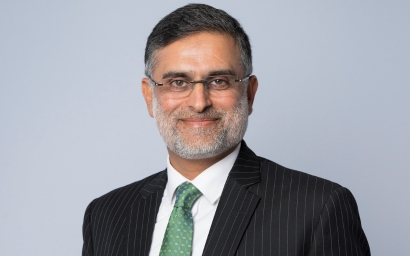 The funds industry is going through a transformational journey focused on generating enhanced yields and elevating the investor experience. Technology is a key driver propelling these initiatives. Standard Chartered’s Shikkoh Malik explains how the firm is leveraging modern technology to achieve efficiencies across the funds landscape.
The evolution of FinTech has made a huge difference throughout the whole financial food chain. The funds industry, being an inherent part of the overall financial industry, sees technology playing an even more significant role going forward.
From opening investor accounts, executing transactions, calculating net asset value (NAV), supporting attribution & performance measurement, conducting post-NAV compliance monitoring and customer servicing to the digitalisation of the payment spectrum, technology has already been used intelligently in many areas across a fund’s life cycle.
But existing technology has its limitations when dealing with change and pace. The possibilities of new technology are boundless, and it can transform the fund ecosystem facilitating an end-to-end, low- or no-touch environment.
Shikkoh Malik, head of group fiduciary and fund services at Standard Chartered, says the funds industry is evolving, enhancing its capabilities and becoming more efficient:
“In most cases, technology is the driver to reach the next level of evolution and efficiencies. In certain cases, it is the stimulus on the back of which some of the markets within the financial industry are moving forward.”
Of course, technology is not the only driving force – there are other fundamental factors, such as the hunt for yield, as investors demand more.
There has been massive growth in the retail mutual funds sector in Asia over the past few years, and technology has played an important role in this growth.
Malik says a great example is Indonesia, where the funds market has grown over the past few years – not only due to enhanced interest specifically from the retail investor segment but also owing to the inclusion of fintech within the distribution chain. Retail investors have started utilising the avenues made available through FinTech channels resulting in a surge of transactions both from existing and new investors. In parallel, the market has also incorporated an infrastructure-based facility, S-Invest, that supports the consolidation and routing of fund orders. Although it started as a basic utility, it has transformed considerably by utilising advanced technology and staying technologically nimble to evolving change.
The funds industry is going through a transformational journey focused on generating enhanced yields and elevating the investor experience. Technology is a key driver propelling these initiatives. Standard Chartered’s Shikkoh Malik explains how the firm is leveraging modern technology to achieve efficiencies across the funds landscape.
The evolution of FinTech has made a huge difference throughout the whole financial food chain. The funds industry, being an inherent part of the overall financial industry, sees technology playing an even more significant role going forward.
From opening investor accounts, executing transactions, calculating net asset value (NAV), supporting attribution & performance measurement, conducting post-NAV compliance monitoring and customer servicing to the digitalisation of the payment spectrum, technology has already been used intelligently in many areas across a fund’s life cycle.
But existing technology has its limitations when dealing with change and pace. The possibilities of new technology are boundless, and it can transform the fund ecosystem facilitating an end-to-end, low- or no-touch environment.
Shikkoh Malik, head of group fiduciary and fund services at Standard Chartered, says the funds industry is evolving, enhancing its capabilities and becoming more efficient:
“In most cases, technology is the driver to reach the next level of evolution and efficiencies. In certain cases, it is the stimulus on the back of which some of the markets within the financial industry are moving forward.”
Of course, technology is not the only driving force – there are other fundamental factors, such as the hunt for yield, as investors demand more.
There has been massive growth in the retail mutual funds sector in Asia over the past few years, and technology has played an important role in this growth.
Malik says a great example is Indonesia, where the funds market has grown over the past few years – not only due to enhanced interest specifically from the retail investor segment but also owing to the inclusion of fintech within the distribution chain. Retail investors have started utilising the avenues made available through FinTech channels resulting in a surge of transactions both from existing and new investors. In parallel, the market has also incorporated an infrastructure-based facility, S-Invest, that supports the consolidation and routing of fund orders. Although it started as a basic utility, it has transformed considerably by utilising advanced technology and staying technologically nimble to evolving change.
Challenges across the fund life cycle
While this kind of growth is very promising, the whole funds industry is facing several other challenges.
There is cost pressure across the board – whether you are a fund manager, a service provider, or an enabler because investors want more for less. “That means you need to deliver more yield and spend less in terms of costs for the fund, which means asset managers need to have an extremely efficient infrastructure to deliver quality and provide an enhanced yield to investors. The same cost pressure is passed onto fund administrators and custodians,” says Malik. Another challenge is the relative lack of transparency in the operations of the fund from an investor’s perspective. Investors fill out a subscription form manually or through a web link or an app and then make sure the relevant cash is moved for that subscription to the fund’s account. "But, even with the most efficient structures and interfaces available today, there is not much insight or transparency, for the investor, into the life cycle of the transaction after that. Hence there is a clear requirement for a fully digital experience,” says Malik. There is also a lack of real-time availability of information. Despite the usage of advanced software, it still takes many hours or even days for the investor accounts to be opened, transactions to settle and eventual issuance of units in investors' names.
 This lack of real-time transparency is primarily the result of another challenge - the lack of interconnectivity between the multiple stakeholders that interact with the fund, starting from domiciliation and structuring to the distribution and servicing of the fund.
Likewise, the lack of advanced web-based channels used for distribution or interaction with the investor poses yet another challenge. Due to the lack of technologically-advanced, relatively standardised and client-friendly channels and interfaces, front-to-back processing of transactions becomes inherently manual.
This results in a time-consuming investor set-up process followed by manual handling of transactions and the inability of a Transfer Agent to handle surges in transactions efficiently. To tap into the growth of the retail investor segment, especially in Asia and the Middle East, along with others, these issues must be tackled. This is where new solutions can emerge and introduce a new level of efficiency for the industry to help remove barriers to future growth.
In the current environment, back-office providers often get no praise for their efforts – they get on with their jobs and typically only come into the spotlight when something goes wrong. But a paradigm shift is occurring: Standard Chartered is on a mission to be proactive, bringing value not only to the traditional back-end processing but is geared to bring efficiency from ‘front to back’ by facilitating automated connectivity and resulting ‘no or low- touch flows’.
“Standard Chartered has ambitions to be an intelligent value-add partner by further revolutionising technology in the financial ecosystem. We want to be super-efficient in the provision of service but also want to do much more than what is expected of back-office providers, especially in the investment funds space, while enhancing investor experience,” says Malik.
This lack of real-time transparency is primarily the result of another challenge - the lack of interconnectivity between the multiple stakeholders that interact with the fund, starting from domiciliation and structuring to the distribution and servicing of the fund.
Likewise, the lack of advanced web-based channels used for distribution or interaction with the investor poses yet another challenge. Due to the lack of technologically-advanced, relatively standardised and client-friendly channels and interfaces, front-to-back processing of transactions becomes inherently manual.
This results in a time-consuming investor set-up process followed by manual handling of transactions and the inability of a Transfer Agent to handle surges in transactions efficiently. To tap into the growth of the retail investor segment, especially in Asia and the Middle East, along with others, these issues must be tackled. This is where new solutions can emerge and introduce a new level of efficiency for the industry to help remove barriers to future growth.
In the current environment, back-office providers often get no praise for their efforts – they get on with their jobs and typically only come into the spotlight when something goes wrong. But a paradigm shift is occurring: Standard Chartered is on a mission to be proactive, bringing value not only to the traditional back-end processing but is geared to bring efficiency from ‘front to back’ by facilitating automated connectivity and resulting ‘no or low- touch flows’.
“Standard Chartered has ambitions to be an intelligent value-add partner by further revolutionising technology in the financial ecosystem. We want to be super-efficient in the provision of service but also want to do much more than what is expected of back-office providers, especially in the investment funds space, while enhancing investor experience,” says Malik.
A forward-looking back-office provider
Distributed ledger technology (DLT) is seen as the key to automating linkages between players, enhancing transparency, facilitation of distribution and value add analytics. But to do this requires alignment of distributors, fund managers, regulators, and service providers, and to achieve this across jurisdictions is a complex and time-consuming task.
Therefore, Standard Chartered decided to take a realistic approach and try to bring what it can deliver through the usage of DLT within the fund administration space first, therefore, providing market players with enhanced flows and connectivity through modern technology. That is why the provider is first focusing on the transfer agency services, with a view to becoming a value-add and commercially viable transfer agency partner that provides clients with efficiencies which go beyond the typical transfer agency services.
Having seen how clients struggle with the manually intensive transfer agency processes coupled with the challenge of the growth of retail fund distribution, Standard Chartered is working on enabling a DLT-based solution. “This year, we will use DLT to enhance our services and facilitate our clients in certain markets within Asia and the Middle East. It will also bring significant overall efficiencies to our own capabilities,” says Malik.
“We want to evolve from just being the back-end partner of traditionally scoped services to a player that not only delivers efficient back-end solutions but supports asset managers to handle other challenges too.”
In this regard, the bank wants to add value to the front end – for example, facilitate distribution where a transfer agent wouldn't have traditionally ventured and to provide additional analytics-based value to the fund manager, which brings both cost and processing efficiencies.In Asia and the Middle East, the bank is spearheading evolution on this front. “By doing that, we will actually be changing the landscape and bringing value that was not earlier envisaged in those markets,” says Malik. Such efforts from a forward-looking provider like Standard Chartered are clearly driving change in the fund services landscape to improve efficiencies for asset managers as well as support them as they dive deeper into the retail investor landscape across growth markets. © 2023 funds global asia

 At times like these, HSBC Asset Management easily pivots towards emerging markets.
At times like these, HSBC Asset Management easily pivots towards emerging markets. A comprehensive, cost-effective, and transparent currency overlay hedging solution is crucial to mitigate FX exposure risks in the complex landscapes of Japan and China's FX markets, explains Hans Jacob Feder, PhD, global head of FX services at MUFG Investor Services.
A comprehensive, cost-effective, and transparent currency overlay hedging solution is crucial to mitigate FX exposure risks in the complex landscapes of Japan and China's FX markets, explains Hans Jacob Feder, PhD, global head of FX services at MUFG Investor Services. The world is transitioning from an era of commodity abundance to one of undersupply. Ben Ross and Tyler Rosenlicht of Cohen & Steers believe this shift may result in significant returns for commodities and resource producers over the next decade.
The world is transitioning from an era of commodity abundance to one of undersupply. Ben Ross and Tyler Rosenlicht of Cohen & Steers believe this shift may result in significant returns for commodities and resource producers over the next decade. Ross Dilkes, fixed income portfolio manager at Wellington Management, examines the opportunities and risks for bond investors presented by the region’s decarbonisation agenda.
Ross Dilkes, fixed income portfolio manager at Wellington Management, examines the opportunities and risks for bond investors presented by the region’s decarbonisation agenda. Shareholders in Japan no longer accept below-par corporate governance standards. Changes are taking place, but there are still areas for improvement, says Tetsuro Takase at SuMi Trust.
Shareholders in Japan no longer accept below-par corporate governance standards. Changes are taking place, but there are still areas for improvement, says Tetsuro Takase at SuMi Trust. Robert St Clair, head of investment strategy at Fullerton Fund Management, explores the reasons investors should be paying attention to the rising demand for healthcare in China.
Robert St Clair, head of investment strategy at Fullerton Fund Management, explores the reasons investors should be paying attention to the rising demand for healthcare in China.


